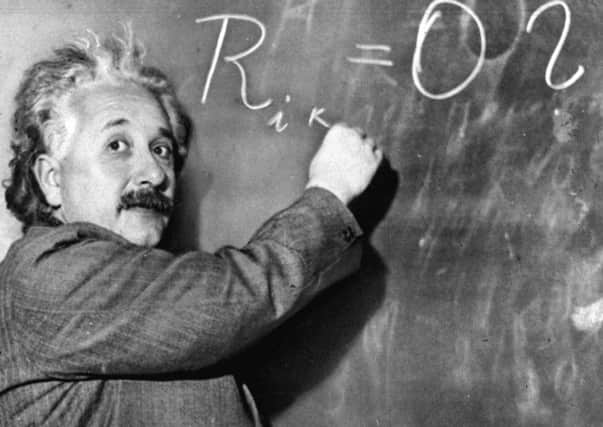Albert Einstein: One of the greatest scientists of all time


A HUNDRED years ago, Albert Einstein gave a lecture at the Prussian Academy of Sciences to explain his latest theory.
Not only did Einstein’s general theory of relativity change the way people viewed the universe, it helped make him one of the most famous scientists of all time.
Advertisement
Hide AdAdvertisement
Hide AdEven so, there were still some in the audience that day who remained sceptical. They questioned whether a new theory of gravitation was really needed, given that Isaac Newton’s theories had appeared to explain everything perfectly well for more than 200 years.
Einstein built up his theory of gravity, general relativity, through a series of experiments and mathematical proofs. Then on November 25, 1915, he showed that gravity is caused by objects with mass such as planets and stars warping space-time - in the same way that light is bent when it passes huge objects like galaxies.
Dr Susan Cartwright, a senior lecturer in physics and astronomy at the University of Sheffield, says although his theory of special relativity is more famous, in some respects his general theory of relativity was more significant.
“If Einstein had fallen under a bus when he was at high school we would still have had a special theory of relativity during the early part of the 20th Century, but it’s not clear this would have been the case with the general theory of relativity.”
Advertisement
Hide AdAdvertisement
Hide AdPrior to this gravity was seen as being a force between two bodies, similar to the electrical force between two charged particles. But Einstein’s general theory changed such assumptions.
“It gave us a much more fundamental insight because it completely changed our conceptual understanding of gravity,” says Dr Cartwright.
A key moment came when the Royal Society put his theory to the test during a solar eclipse in 1919. “They organised two expeditions to observe it and they did in fact observe a shift in the position of stars that general relativity predicted.”
The expeditions, and the vindication of Einstein’s theory, caused a flurry of excitement in the press. “I think his 1915 papers and the coverage of the eclipse expeditions probably did more to cement Einstein’s image in popular culture than anything else.”
Advertisement
Hide AdAdvertisement
Hide AdEven now, 60 years after his death, he remains one of the most important scientists who ever lived. “If you asked a typical physicist who the three greatest physicists in history are, I suspect they would say, in no particular order, ‘Isaac Newton, James Clerk Maxwell and Albert Einstein,’” says Dr Cartwright.
Dr Mike Evans, from the School of Mathematics at the University of Leeds, says Einstein’s general theory continues to have a huge influence on scientific understanding.
“Anyone doing research in applied physics or mathematics is Einstein’s intellectual descendent. You can’t do any research in either field without building on his foundations,” he says.
Einstein has become a 20th Century icon whose achievements have transcended science. His image - the moustache, dark eyes and unruly explosion of hair - can be found on T-shirts accompanied by one of his many aphorisms and on posters - alongside those of rock stars and the ubiquitous Che Guevara - that adorn the bedroom walls of students all over the world.
Advertisement
Hide AdAdvertisement
Hide AdDr Evans says his global popularity is down to the person as much as his scientific legacy.
“He had great charisma, he was a star as well as a genius and we remember his scientific achievements but also his humanity.”
As Einstein himself once said: “Learn from yesterday, live for today, hope for tomorrow. The important thing is not to stop questioning.”